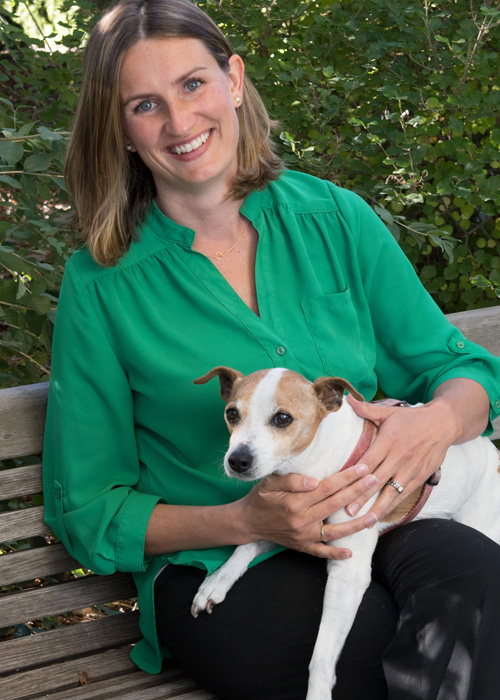
Dr. Keara Boss, D.V.M., Ph.D., Diplomate ACVR (Radiation Oncology)
Associate Professor, Radiation Oncology
I was born and raised in western Massachusetts, near Amherst. My father is a physician and it has been inspiring to see his love for the practice of medicine and his joy in his career. While I was growing up, he and my mother continually encouraged my interests in science.
I became aware of veterinary medicine as a career at an early age because my four siblings and I grew up with a “zoo” of pets: several dogs, rabbits, hamsters, birds, lizards and turtles. We were a big pack of kids with a herd of pets and we enjoyed every minute of childhood. I went along on all veterinary appointments and our very patient veterinarian listened to my questions and included me in the process.
At the University of Massachusetts at Amherst, I entered the animal science program. Much of my undergrad life included early morning jobs at a couple of pig farms and dairy farms and I loved the work. For my senior honors thesis comparing alligator and crocodile farming, I studied in Australia working with crocodile farmers, and then in Abbeville, Louisiana, with alligator ranchers.
Considering veterinary school, I was drawn to North Carolina State University; I loved that you could see the cows roam by the window while studying in the library. Initially, I wasn’t sure where focus in veterinary medicine, veering first toward swine medicine, then zoo medicine, then surgery. During my second year, my interest was piqued by a presentation on the topic of surgical oncology, and then learning more about cancer biology, a light went on. I knew I wanted a career studying cancer.
To better understand oncology, I was encouraged to spend time in the lab. I worked in the laboratory of Dr. Matthew Breen, studying comparative canine cancer genetics; and later, with Dr. Steve Suter, experimenting with laser capture microdissection to investigate canine lymphoma in new ways. I was fortunate to attend a presentation by Dr. Don Thrall, distinguished veterinary radiation oncologist and radiologist at NCSU, where I first learned about how radiation therapy can destroy cancer cells. I was drawn to radiation oncology and I’ve never looked back.
After a small animal internship at the University of Pennsylvania, I returned to NCSU for a radiation oncology residency. As it was ending, I decided, with encouragement from Dr. Thrall, to continue my training in laboratory research, so I entered the Ph.D. program at NCSU in Comparative Biomedical Sciences with a focus in Cell Biology.
Dr. Mark Dewhirst, Gustavo S. Montana Professor of Radiation Oncology at Duke University, welcomed me into his lab as my Ph.D. mentor. Dr. Dewhirst is a renowned radiobiologist, and his research has advanced both veterinary and human radiation oncology. I was incredibly humbled to be included in his circle of cancer researchers.
I entered a whole new world of tissue culture, lab mice, and intense cancer literature reviews. For the next five years, I was part of a team searching for answers to many exciting questions. I was encouraged and pushed beyond my comfort zone and I learned so much. Dr. Dewhirst guided me during my time as a Ph.D. student, as well as preparing me for the next steps in my career.
Joining the FACC team, I have returned to clinics after years in the lab and my dream is to step up and contribute to advances in comparative oncology by bringing what I’ve learned in the lab to the clinic. I believe a good radiation oncologist must be compassionate and communicate clearly and honestly with patient families, listening attentively to understand their goals for their pet before embarking on a treatment plan. A good radiation oncologist must also be curious, always asking—why are we doing it this way? Would doing something different be better? How can we improve?
I love my work, but the lights in my life are my husband, Brian, our wonderful children, Harvey and Ellen; and our pets: Jack Russell terrier, Pokey, and cats, Willis and Peggy.